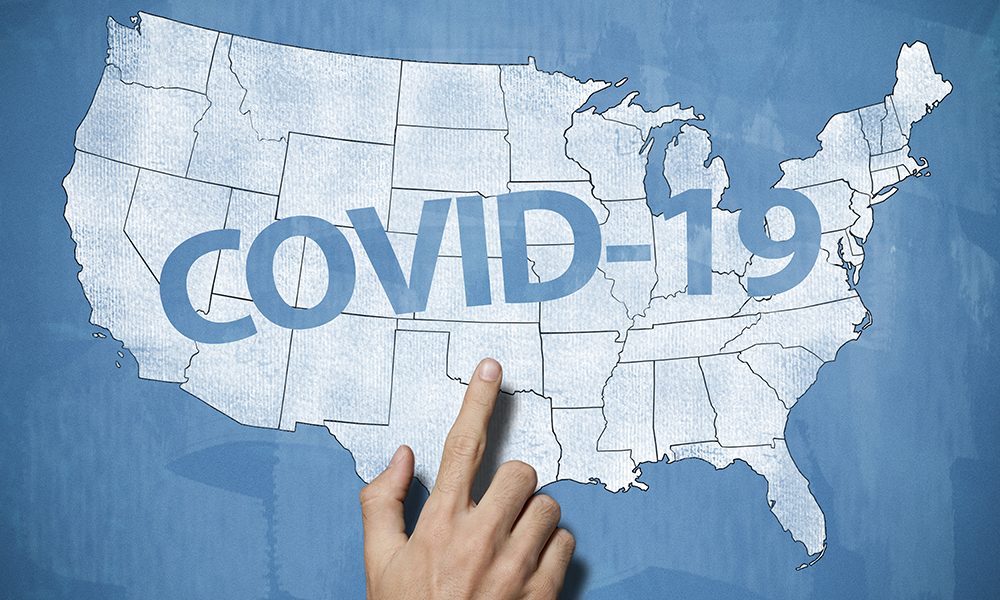Americans perceive the coronavirus pandemic to be a crisis that is being better handled by their state’s governor (64%) than by President Donald Trump (32%). Expectedly, a wide partisan divide exists, but even one in four Republicans (25%) think their governor is more adept at handling the crisis. 86% of Democrats and 70% of independents say their governor has a better approach than Trump. Among Republicans, 73% say Trump is more effective at dealing with the crisis.
Among most demographic groups, at least a majority of Americans thinks their governor is addressing the coronavirus pandemic better than the president. There is one exception. White men without a college education divide. 50% of these residents believe their governor is more capable at handling the pandemic while 49% say the president is exhibiting better leadership during the crisis. Also of note, non-white residents (71%), women (70%), and white Americans with a college degree (66%) are more likely than white residents (61%), men (58%), and white residents without a college degree (56%) to assert their state’s governor is more effectively handling the pandemic than the president.
“The stakes couldn’t be higher,” says Dr. Lee M. Miringoff, Director of The Marist College Institute for Public Opinion. “For the nation, it all boils down to timing. Americans are reacting to when COVID-19 appeared on the national agenda, when they think the country should reopen, and what the economy and COVID-19 will be like come November.”
A majority of Americans (55%) disapprove of how President Trump is handling COVID-19. This is up from 49% in the Mid-March NPR/PBS NewsHour/Marist Poll. 44%, identical to 44% previously, approve of the president’s approach.
Most Democrats (87%) consider the president to be falling short in his handling of the crisis while most Republicans (89%) think his approach hits the mark. Among independents, 58% disapprove, and 40% approve.
Americans divide about President Trump’s handling of the economy. 50% of Americans approve of his performance on the economy, and 48% disapprove. In March, 51% of residents approved of the president’s approach, and 45% disapproved. Independents are more positive about the president’s handling of the economy (+5 points) than they are about his leadership during the COVID-19 crisis (-18 points).
To compound matters for the president, 54% of Americans think their state’s governor is doing a better job handling the economy than the president (39%). A wide partisan divide exists. 78% of Democrats and 59% of independents think their governor has the better approach. In contrast, 84% of Republicans think the president is more capable of dealing with the economy.
Women are twice as likely to say their governor (62%) is doing a better job handling the economy than Trump (31%). Men, especially white men with a college degree, divide. 47% of men think Trump is performing better on the economy while 45% say their governor is outperforming the president.
There has been a sharp increase in the proportion of working Americans who are experiencing employment insecurity as a result of the coronavirus pandemic. 50% of Americans excluding those not employed or retired, up from 18% in March, report they or someone in their household have been let go or have had their hours reduced because of the pandemic. Although Americans from all walks of life have been impacted by the crisis, those more likely to have experienced the economic repercussions are non-white, younger, lower income, or without a college degree.
Most Americans oppose lifting social distancing restrictions, especially in larger, group settings. 91% of Americans think it is a bad idea to allow people to attend sporting events without further testing. 85% do not think it is wise for schools to reopen, and 80% think it is a bad idea for restaurants to allow customers to dine in. 65% of residents consider it a bad idea for people to go back to work without further testing. There is broad consensus across party lines on maintaining restrictions except on the issue of returning to work. 84% of Democrats and 65% of independents want to continue stay at home policies while 51% of Republicans think it would be a good idea to get back to business.

Turning to this fall’s presidential election, 34% of Americans report the coronavirus will be either a major (14%) or minor factor (20%) in deciding their vote. 64% of Americans report they have already made up their mind about who they plan to support. 68% of Democrats, 74% of Republicans, and 56% of independents say they have already selected a candidate. Democrats (16%) and independents (15%) are more than twice as likely as Republicans (7%) to say the pandemic will be a major factor when casting their ballot.
55% of Americans say they would prefer Joe Biden to be handling the COVID-19 crisis than President Trump. 40% would rather Trump be managing the situation. Again, opinions fall along partisan lines. A majority of independents (55%) would prefer that Biden be handling the crisis.
Biden (51%) also outperforms Trump (44%) on who Americans would rather have handling the economy. Independents divide. 47% think Biden is the better option while 45% say Trump is preferential to deal with the economy.
“On these two critical issues, handling the economy and dealing with the coronavirus pandemic, men and women view Donald Trump and Joe Biden through very different lenses,” says Dr. Lee M. Miringoff, Director of The Marist College Institute for Public Opinion. “The gender gap on who can better handle the economy is 40 points, and it is 30 points on who can better deal with the COVID-19 crisis.”
Complete April 29, 2020 NPR/PBS NewsHour/Marist Poll Release of the United States

